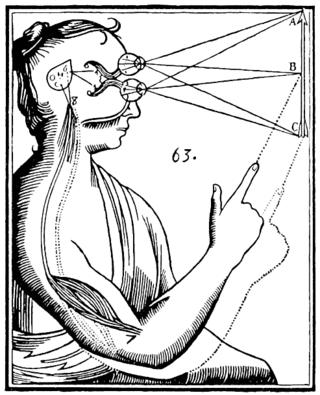Related Research Articles
Epiphenomenalism is a position in the philosophy of mind on the mind–body problem. It holds that subjective mental events are completely dependent for their existence on corresponding physical and biochemical events within the human body, but do not themselves influence physical events. According to epiphenomenalism, the appearance that subjective mental states influence physical events is an illusion, with consciousness being a by-product of physical states of the world. For instance, fear seems to make the heart beat faster, but according to epiphenomenalism, the biochemical secretions of the brain and nervous system —not the experience of fear—is what raises the heartbeat. Because mental events are a kind of overflow that cannot cause anything physical, yet have non-physical properties, epiphenomenalism is viewed as a form of property dualism.
Idealism in philosophy, also known as philosophical idealism or metaphysical idealism, is the set of metaphysical perspectives asserting that, most fundamentally, reality is equivalent to mind, spirit, or consciousness; that reality is entirely a mental construct; or that ideas are the highest type of reality or have the greatest claim to being considered "real". Because there are different types of idealism, it is difficult to define the term uniformly.
Materialism is a form of philosophical monism which holds that matter is the fundamental substance in nature, and that all things, including mental states and consciousness, are results of material interactions of material things. According to philosophical materialism, mind and consciousness are caused by physical processes, such as the neurochemistry of the human brain and nervous system, without which they cannot exist. Materialism directly contrasts with idealism, according to which consciousness is the fundamental substance of nature.
In philosophy, physicalism is the view that "everything is physical", that there is "nothing over and above" the physical, or that everything supervenes on the physical. It is opposed to idealism, according to which the world arises from mind. Physicalism is a form of ontological monism—a "one substance" view of the nature of reality, unlike "two-substance" or "many-substance" (pluralism) views. Both the definition of "physical" and the meaning of physicalism have been debated.

In many religious and philosophical traditions, the soul is the non-material essence of a person, which includes one's identity, personality, and memories, an immaterial aspect or essence of a living being that is believed to be able to survive physical death. The concept of the soul is generally applied to humans, although it can also be applied to other living or even non-living entities, as in animism.
Solipsism is the philosophical idea that only one's mind is sure to exist. As an epistemological position, solipsism holds that knowledge of anything outside one's own mind is unsure; the external world and other minds cannot be known and might not exist outside the mind.

In the philosophy of mind, mind–body dualism denotes either the view that mental phenomena are non-physical, or that the mind and body are distinct and separable. Thus, it encompasses a set of views about the relationship between mind and matter, as well as between subject and object, and is contrasted with other positions, such as physicalism and enactivism, in the mind–body problem.
In the philosophy of mind, panpsychism is the view that the mind or a mind-like aspect is a fundamental and ubiquitous feature of reality. It is also described as a theory that "the mind is a fundamental feature of the world which exists throughout the universe". It is one of the oldest philosophical theories, and has been ascribed to philosophers including Thales, Plato, Spinoza, Leibniz, William James, Alfred North Whitehead, Bertrand Russell, and Galen Strawson. In the 19th century, panpsychism was the default philosophy of mind in Western thought, but it saw a decline in the mid-20th century with the rise of logical positivism. Recent interest in the hard problem of consciousness, and developments in the fields of neuroscience, psychology, and quantum mechanics have revived interest in panpsychism in the 21st century.

In the philosophy of mind, the hard problem of consciousness is to explain why and how humans and other organisms have qualia, phenomenal consciousness, or subjective experience. It is contrasted with the "easy problems" of explaining why and how physical systems give a (healthy) human being the ability to discriminate, to integrate information, and to perform behavioral functions such as watching, listening, speaking, and so forth. The easy problems are amenable to functional explanation—that is, explanations that are mechanistic or behavioral—since each physical system can be explained purely by reference to the "structure and dynamics" that underpin the phenomenon.
A philosophical zombie is a being in a thought experiment in the philosophy of mind that is physically identical to a normal human being but does not have conscious experience.

"Cartesian theater" is a derisive term by philosopher and cognitive scientist Daniel Dennett, made known in his 1991 book Consciousness Explained, to refer pointedly to a defining aspect of what he calls Cartesian materialism, which he considers to be the often unacknowledged remnants of Cartesian dualism in modern materialist theories of the mind.

In philosophy of mind, Cartesian materialism is the idea that at some place in the brain, there is some set of information that directly corresponds to our conscious experience. Contrary to its name, Cartesian materialism is not a view that was held by or formulated by René Descartes, who subscribed rather to a form of substance dualism.
Metaphysical naturalism is a philosophical worldview which holds that there is nothing but natural elements, principles, and relations of the kind studied by the natural sciences. Methodological naturalism is a philosophical basis for science, for which metaphysical naturalism provides only one possible ontological foundation. Broadly, the corresponding theological perspective is religious naturalism or spiritual naturalism. More specifically, metaphysical naturalism rejects the supernatural concepts and explanations that are part of many religions.
The philosophy of mind is a branch of philosophy that deals with the nature of the mind and its relation to the body and the external world.

The mind–body problem is a philosophical problem concerning the relationship between thought and consciousness in the human mind and body.

Michael Tye is a British philosopher who is currently the Dallas TACA Centennial Professor in Liberal Arts at the University of Texas at Austin. He has made significant contributions to the philosophy of mind.
R. William Hasker is an American philosopher and Distinguished Professor Emeritus of Philosophy at Huntington University. For many years, he was editor of the prestigious journal Faith and Philosophy. He has published many journal articles and books dealing with issues such as the mind–body problem, theodicy, and divine omniscience.
Interactionism or interactionist dualism is the theory in the philosophy of mind which holds that matter and mind are two distinct and independent substances that exert causal effects on one another. An example of your mind influencing your body would be if you are depressed, you can observe the effects on your body, such as a slouched posture, a lackluster smile, etc. Another example, this time of your body affecting your mind would be: If you struck your toe very forcefully on a door, you would experience terrible pain. Interactionism is one type of dualism, traditionally a type of substance dualism though more recently also sometimes a form of property dualism. Many philosophers and scientists have responded to this theory with arguments both supporting and opposing its relevance to life and whether the theory corresponds to reality.
Personal identity is the unique numerical identity of a person over time. Discussions regarding personal identity typically aim to determine the necessary and sufficient conditions under which a person at one time and a person at another time can be said to be the same person, persisting through time.

Galileo's Error: Foundations for a New Science of Consciousness is a 2019 book authored by British philosopher Philip Goff. The book presents a defense of the theory of panpsychism as the solution to the hard problem of consciousness. The title of the book refers to Galileo inaugurating science by dividing the world into two “radically different kinds of entities” — the quantitative characteristics, which became the domain of science, and the qualitative characteristics which are the soul’s response to the physical world.
References
- 1 2 3 "Philosophy professor to deliver March 3 Honors Council lecture". Bemidji State University. 2010. Archived from the original on September 26, 2024.
- ↑ "Doctoral Dissertations, 1973". The Review of Metaphysics. 27 (1): 187–210. 1973.
- 1 2 Rundle, Bede (1998). "Perception, Mind and Personal Identity: A Critique of Materialism". International Studies in Philosophy. 30 (4): 130–131. doi:10.5840/intstudphil199830430.
- ↑ Twemlow, Stuart W. (1986). "Death and Consciousness by David H. Lund (Book Review)". Bulletin of the Menninger Clinic. 50 (5): 497.
- ↑ "Contemporary Dualism: A Defense". Routledge. 2016. Archived from the original on June 24, 2024.
- ↑ "Books Briefly Noted". Zetetic Scholar. 13 (1): 195. 1987.
- ↑ Brier, Bob (1986). "Death and Consciousness by David H. Lund (Book Review)". The Journal of Parapsychology. 50 (2): 162.
- ↑ Madell, Geoffrey (1996). "Book Reviews". Mind. 105 (420): 708. doi:10.1093/mind/105.420.708.
- ↑ "Book Advocates Philosophical Concept of Distinct Self". Horizons. 21 (2): 2. 2006.
- ↑ "Persons, Souls and Death". McFarland. 2024. Archived from the original on September 26, 2024.
- ↑ "Death and Consciousness". McFarland. 2024. Archived from the original on September 26, 2024.